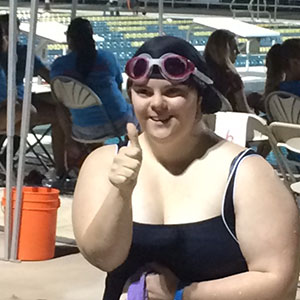Julia Banahan: Taking On The World One Dream At A Time
At 26 years old, Julia Banahan has already accomplished more than a lot of folks could only dream of, and she is just getting started. What makes Julia’s story especially noteworthy is that she has Down syndrome (DS). The Department of Economic Security’s (DES) Division of Developmental Disabilities (DDD) serves individuals everyday who, like Julia, fight for the very opportunities many people take for granted—working, volunteerism and the right to follow your dreams.

Paula Banahan, Julia’s mother, says she has never discouraged her daughter even though Julia has to work harder than most people. Paula says, “Julia is an inspiration to so many people; it’s unbelievable!” Julia continually pushes the envelope by shattering common misconceptions about people with disabilities. Julia holds a part-time job as a hostess-in-training at a popular Valley restaurant, Aunt Chilada’s. When she isn’t working, you will find her volunteering at the Phoenix Children’s Hospital Down Syndrome Clinic where she helps parents with kids just like her. Julia interviewed for these opportunities on her own, and in her words, she “nailed it” in both cases. Paula recalls the conversation with the manager at Aunt Chilada’s following Julia’s interview. “She (the manager) walked up to us sitting at the table and said, ‘Yep, she nailed it alright. I gave her the same test I give all potential employees and she did fabulous!’“
Julia’s accomplishments alone could easily fill an entire page. Along with gold medals for swimming in the Special Olympics, public speaking, and reading to children at Madison Elementary School, one of her greatest triumphs came recently. Julia told her mother, about three years ago, that she desired a career as a Certified Nursing Assistant. In order to practice as a CNA, an individual must pass two major hurdles. The first is the training required for certification, which Julia passed on her second attempt. The second is the licensing phase. The test to become licensed is largely based on a candidates critical thinking abilities. Because Down syndrome is a cognitive disorder, the phrasing of a question can make all the difference in one’s ability to understand what is being asked. This phase has proven to be especially challenging for her, but she isn’t giving up on her dreams of nursing.
Julia has made tremendous strides toward achieving her goals. And even though she knows her greatest challenges may lie ahead, for someone who always sees the glass half-full, this also means her greatest victories are still to come.
Julia's biggest dream in life is to be in love. When asked how that will happen, she simply says, “When I find the right guy, I'll know!”
By Vielka Atherton

